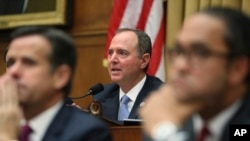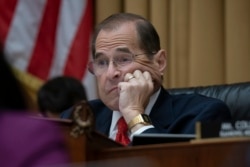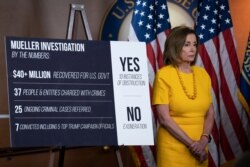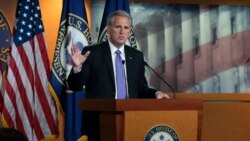The prospects of U.S. Democratic lawmakers impeaching President Donald Trump appears to have significantly diminished after former special counsel Robert Mueller offered no new explosive allegations about the U.S. leader in hours of congressional testimony this week.
One of the overseers of Mueller's hearing, House Intelligence Committee Chairman Adam Schiff, told CNN on Thursday, "We do need to be realistic, and that is, the only way he's leaving office, at least at this point, is by being voted out" in the 2020 election in which Trump is seeking a second four-year term.
"Should we put the country through an impeachment?" Schiff asked rhetorically. "I haven't been convinced yet that we should. Going through that kind of momentous and disruptive experience for the country, I think, is not something we go into lightly."
He said Democratic "efforts need to be made in every respect to make sure we turn out our people" to vote against the Republican Trump in the November 2020 election.
Congressman Jerrold Nadler, chairman of the House Judiciary Committee that questioned Mueller for more than three hours on Wednesday, has pushed to launch impeachment hearings against Trump. But House Speaker Nancy Pelosi has blocked the effort so far, fearing the political repercussions and believing it ultimately would prove to be an empty gesture.
Even if House Democrats were able to muster the simple majority vote necessary to approve articles of impeachment, the Republican-controlled Senate would not vote by the required two-thirds majority to convict Trump and remove him from office.
Schiff said, "I would be delighted if we had a prospect of removing him through impeachment, but we don't, and the most attractive thing to me about an impeachment is that it's among the strongest forms of censure we have. But the same is true of an acquittal for the president. That's the strongest form of exoneration for him, and that stays my hand."
After the Mueller hearings before the judiciary and intelligence committees, Pelosi declined to take impeachment off the table as a possibility, but also did not endorse immediate impeachment hearings. Instead, she continued to call for Democrats to pursue multiple investigations of Trump and his administration's policies and supported legal challenges to the White House's refusal to allow congressional testimony by key current and former Trump officials.
"If we have a case for impeachment, that's the place we will have to go," Pelosi told reporters. "Why I'd like it to be a strong case is because it's based on the facts — the facts and the law, that's what matters. The stronger our case is, the worse the Senate will look for just letting the president off the hook."
But Pelosi said the Democrats' investigations are "not endless in terms of time."
"If it comes to a point where the cone of silence and the obstruction of justice and the cover up in the White House prevents us from getting that information, that will not prevent us from going forward and in fact, it's even more grounds to go forward," Pelosi said.
About 90 of the 235 Democrats in the 435-member House of Representatives have called for Trump's impeachment or the start of an impeachment inquiry, One more Democratic lawmaker, Congresswoman Lori Trahan of Massachusetts, added her name to the list after Mueller's testimony. Some Democratic lawmakers had thought many more might support an impeachment call after hearing Mueller's testimony.
Republicans have scoffed at even the possibility of attempting to impeach Trump.
House Minority Leader Kevin McCarthy said Thursday, "Why would you even bring up impeachment after that (Mueller) hearing? Why would they even put the American public through this?"
Schiff's assessment downplaying impeachment as a way to oust Trump from the White House came a day after hours of Mueller's sometimes halting testimony about the 448-page report he and his team of prosecutors compiled about their 22-month investigation. They probed Russian meddling in the 2016 U.S. presidential election and whether Trump, as president, obstructed justice by trying to thwart the probe.
Mueller, as he had vowed to do, stuck closely to his team's findings, rebuffing Democratic lawmakers' entreaties to offer damning new information about Trump or to discuss Republican lawmakers' claim that his investigation should never have been opened or was biased against Trump.
The prosecutor had concluded there was not enough evidence to charge Trump with conspiring with Russia to help him win the election, even though his campaign had dozens of contacts with Russian operatives.
In his report, Mueller laid out as many as 11 instances when Trump allegedly engaged in obstructive behavior, although Mueller declined to decide whether Trump should be charged with a criminal offense because of a Justice Department policy prohibiting criminal charges against a sitting president. Subsequently, Attorney General William Barr and then-Deputy Attorney General Rod Rosenstein said no charges were warranted against Trump.
Trump has repeatedly claimed exoneration in the probe, but Mueller said he had not cleared the president of obstruction allegations and that Trump could be charged after he leaves office.
Trump said this week that lawmakers calling for his impeachment "have gone totally crazy."
National polls in the U.S. show majorities against impeaching Trump, with a recent Washington Post-ABC News survey saying that 59% oppose Trump's impeachment and 37% favor it.








